
Treatments For Arthritis, Hip & Leg Problems
It’s excruciating to see your Golden Retriever in pain. When you take a pet into your home you promise to love and care for it the best you can for as long as you can, but arthritis and joint pain can strike at any time and leave you feeling helpless.
Prescription NSAID pain relievers certainly have their place, but they can be tough on your Golden Retriever’s liver and steroids come with a host of side effects. Luckily there are natural steps you can take to keep your dog comfortable.
Here are 10 drug-free ways to help your dog live pain-free. Be sure to consult your veterinarian before making any major changes to your dog’s diet, exercise or medication routine.
1. Maintain A Healthy Weight
The more extra weight your dog carries, the more strain his or her joints suffer. If your dog is overweight or obese, now is the time to start a weight loss regimen. If your arthritic dog is already at a healthy weight, be sure to maintain it with a healthy diet and gentle exercise.
2. Keep Moving
If your dog is diagnosed with arthritis you will definitely want to revamp his or her exercise routine, but staying active is important for joint health. Instead of long, vigorous walks or strenuous play sessions, try frequent shorter walks and short play sessions indoors on soft carpet.
3. Add Anti-Inflammatory Foods to Your Dog’s Diet
Certain foods are said to have natural anti-inflammatory properties. If your veterinarian feels it is safe, you can try adding papaya, alfalfa, celery, or ginger to your dog’s diet. Another ingredient that has become very popular in recent years is turmeric for dogs, which has been shown to have incredibly strong anti-inflammatory effects.
4. Canine Acupuncture
It may seem shocking that a dog would tolerate dozens of needles being placed into his or her body, but the acupuncture trend has become quite popular in the animal world and has shown promising results for many common canine ailments, including joint pain.
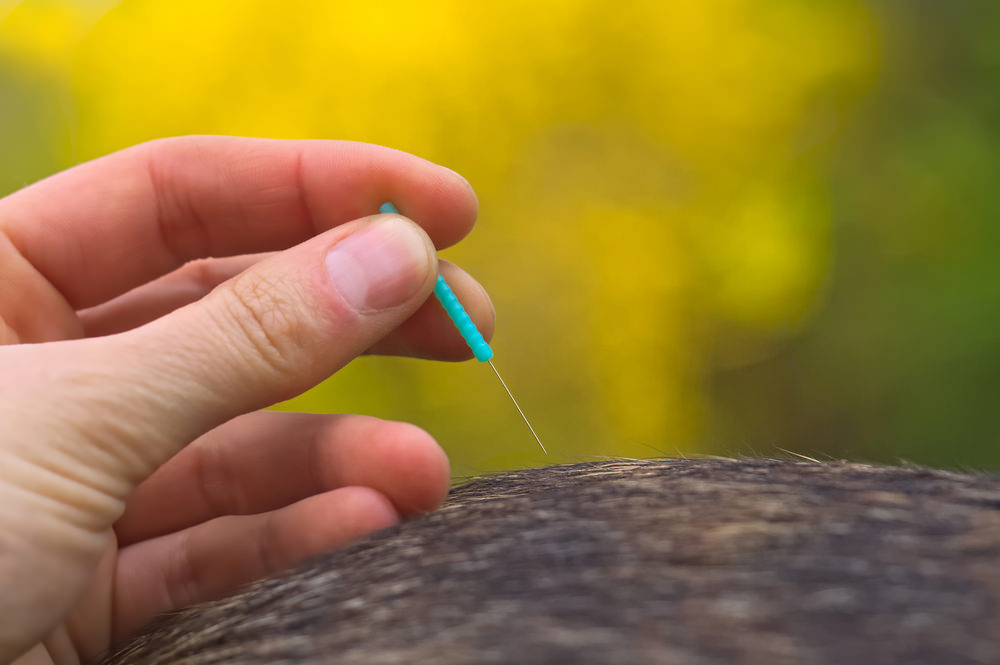
5. Physical Therapy
Many veterinary hospitals and specialty centers now offer advanced services for dogs with injuries, arthritis and mobility issues. Highly trained staff members can help keep your dog’s pain at bay with techniques like hydrotherapy. They can also teach you how to provide physical therapy at home.
6. Laser Therapy
One of the newer innovations in reducing inflammation and pain in pets is low-level laser therapy. Your veterinarian will create a schedule of treatments based on your dog’s individual needs. The treatments are easy, painless and relatively quick. You can read more about the best red light therapy devices for dogs here.
7. Massage Therapy
The same massage techniques that help relieve your stiff muscles and aching joints can also benefit your arthritic pup. Many human massage therapists also work on pets and holistic veterinarians often offer this service to their clients.
8. Prevent Slipping
Hard wood and tile floors can be like mine fields for arthritic pets. Try laying down a series of throw rugs and runners to help your dog navigate the house. Keep toenails trimmed and consider friction socks to prevent slipping.
9. Provide A Supportive Orthopedic Dog Bed
An unsupportive mattress can wreak havoc on sore joints. Be sure your dog’s bed is designed for pups with arthritis. You can review our roundup of the best orthopedic beds for dogs here.
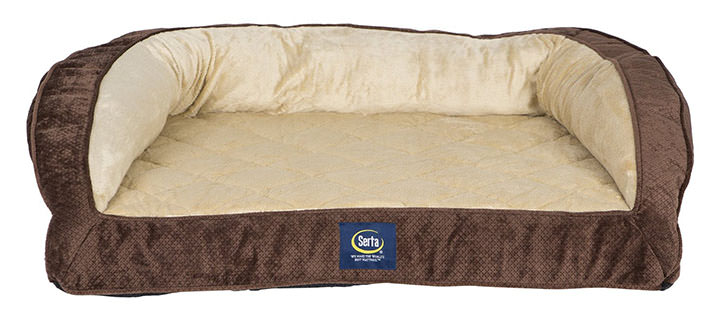
10. Supplements
Not all canine joint supplements are created equal. Many products only contain one active ingredient (glucosamine being the most popular) while others contain more than one. For example, this 8-in-1 canine joint supplement contains not just glucosamine, but also turmeric, green lipped mussel, MSM, chondroitin, devil’s claw, and more. It’s important to choose a joint health supplement that offers the correct therapeutic dosage for your Golden Retriever’s needs and is made from the highest quality ingredients.
To learn more about the 8-in-1 Canine Joint Supplement, visit here.
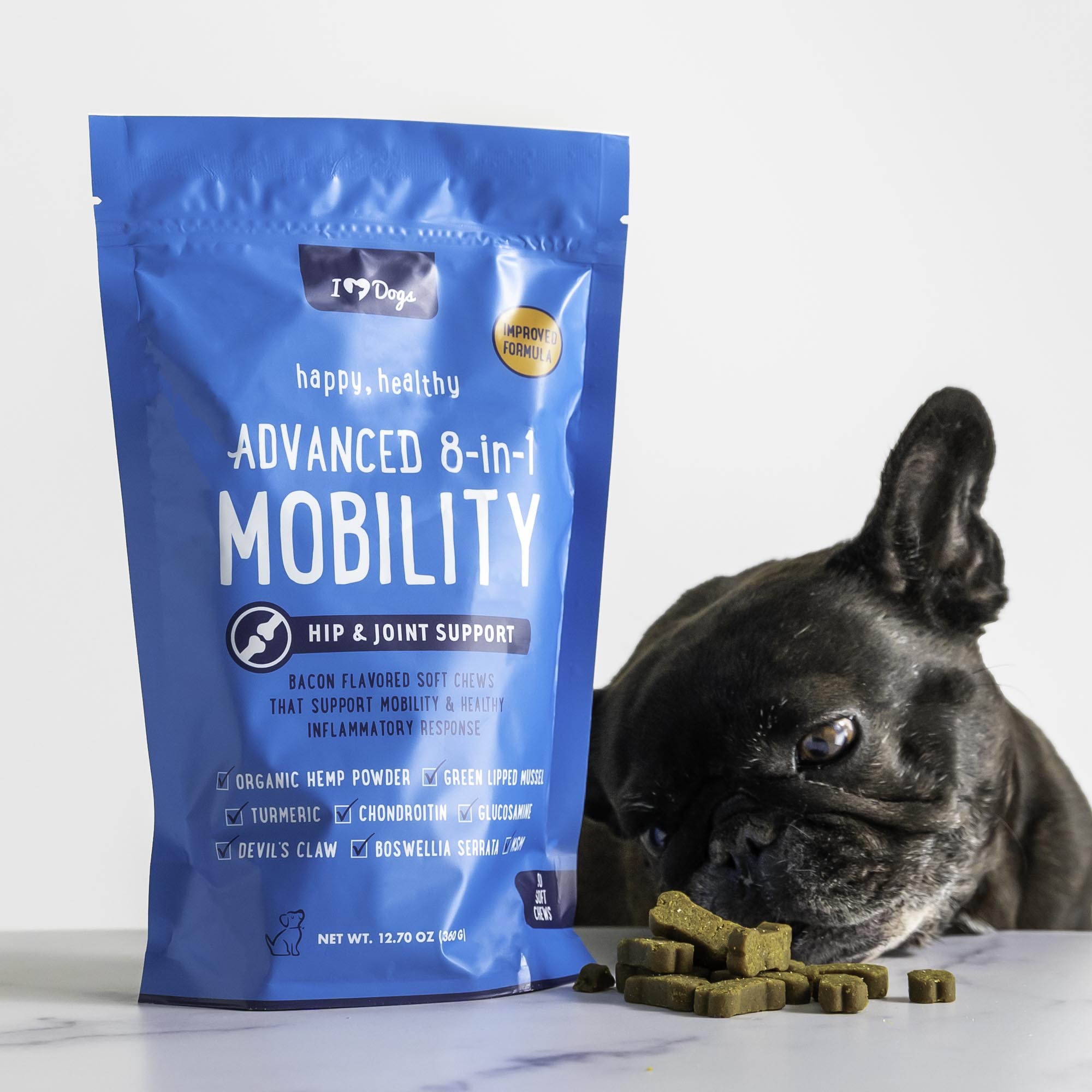
11. Hemp Extract Supplements
In last last 5 years, many studies have been done on the effectiveness of full and broad spectrum hemp oil in relieving support an arthritic dog’s mobility. Here at iHeartDogs, we use and recommend that Cannanine brand of hemp chews available on Amazon.
Frequently Asked Questions:
Do Golden Retrievers Need Hip And Joint Supplements?
Golden Retrievers are prone to hip and elbow dysplasia, as well as osteoarthritis, which are both joint problems. Dysplasia problems start during development, but arthritis gets worse with age. You can take some of the same steps to help keep your Golden Retriever’s joints healthy throughout their life.
Joint supplements have been shown to help prevent, treat, or even slow down conditions like arthritis. Working dogs, agility dogs, and dogs with underlying musculoskeletal conditions are more likely to have joint problems later in life. These dogs can benefit the most from taking joint supplements when they are young. Even if they do not run every day, older dogs could also benefit from supplements since it is thought that 20% of dogs will get arthritis at some point in their lives.
What Supplements Are Good For Golden Retrievers Arthritis?
The 8-in-1 Canine Joint Supplement by iHeartDogs contains substances such as broad-spectrum hemp oil, glucosamine, turmeric, green-lipped mussel, MSM, chondroitin, and devil’s claw, amongst others. These ingredients work in tandem to help fight arthritis and joint problems in dogs. They are the ideal combination of eight potent, all-natural substances that work in concert to encourage healthier joints, decreased pain, and increased physical activity.
What Can I Give My Golden Retriever For Joint Pain & Arthritis?
You have several options to help combat joint pain and arthritis in your Golden Retriever, starting with CBD oil. It’s gained popularity as it helps to fight inflammation while improving overall health and even reducing anxiety. Other common options are glucosamine, omega-3 fatty acids, and MSM, all of which help to prevent or reduce joint pain issues.
Is Cosequin Or Dasuquin Better For A Golden Retriever?
Larger dogs like Golden Retrievers are prone to hip and joint problems, and both Cosequin and Dasuquin use active ingredients to combat both. Both of these dietary supplements contain glucosamine and sodium chondroitin sulfate, which are essential for joint health. However, only Cosequin contains the omega-3 fatty acids required by the body to carry out its many functions. Dasuquin, on the other hand, contains avocado/soybean unsaponifiable (ASU), a molecule found naturally in avocados and soybean oils. The only way to know for certain which one is best for your dog is to put both to the test or to listen to your veterinarian’s advice, as both work well for larger dogs.
Do Big Dogs Need Joint Supplements?
No matter the dog’s size, arthritis sufferers need joint supplements. All sizes of dogs are susceptible to suffering from joint damage and pain. Larger dogs tend to be more active and do more, leading to higher chances of joint pain at older ages. Not every older dog needs a supplement for their joints, but it can help many older dogs live better lives.
What Does Coconut Oil Do For Golden Retrievers Joints?
For many years, coconut oils have been recommended as an excellent all-natural way to reduce inflammation. Newer research, however, suggests coconut oil is inflammatory and can result in a leaky gut. No matter the dosage, it may upset the stomach and cause loose stools, diarrhea, and irritation of the gut lining.
The various acids in coconut oil may help dogs who do not have sensitive stomachs with their arthritic problems. Although fatty acids are good for brain health, they might not be sufficient to help with arthritis or to help the brain deal with digestive problems. Before making a choice, consult your veterinarian because coconut can be too harsh on its own.
Is Glucosamine Good For Golden Retrievers?
Glucosamine naturally exists in your dog’s body, and it contributes to the formation of tendons, ligaments, and joint fluid. The substance prevents bone-on-bone contact, so cartilage can work to shield and cushion the joints. Yet, degenerative joint conditions like osteoarthritis cause the cartilage in the joints to degrade, which causes discomfort and inflammation. Without this fantastic natural nutrient, dogs would have a much harder time enjoying life or living without pain.
What Are The Best Vitamins For Golden Retrievers?
Vitamins are chemical substances essential for maintaining life. However, no single vitamin outweighs the others, as dogs need all their vitamins to survive and live well. The vast majority are found in their natural state in food, meaning you should not need to supplement unless the food your dog likes skimps on vitamins, especially from natural sources.
Omega-3 fatty acids naturally alleviate inflammation and balance omega-6s in your dogs. Vitamins are life-sustaining organic molecules. Most are food-based. Vitamins maintain and grow animals. Here are some of the equally necessary vitamins for your Golden Retrievers:
Vitamin A is in dog eye care supplements.
B vitamins like thiamine regulate energy and carbohydrate metabolism and activate neural tissue ion channels.
Vitamin C reduces inflammation and cognitive aging.
Vitamin D, the “sunshine vitamin,” helps your dog balance minerals like calcium for bone growth. Your dog needs it to build and maintain strong muscles and bones.
Vitamin E protects your dog and helps with cell and fat metabolism.
Vitamin K stimulates blood clotting in dogs.
Most dog food includes these vitamins naturally. However, foods with higher quality ingredients will always have higher quantities of minerals and vitamins. Cheaper dog foods use filler ingredients that fill your dogs stomach but does not provide adequate nutrition.
What Meat Is Best For Golden Retrievers With Arthritis?
Give your dog a diet that contains a high proportion of protein derived from sources of high quality, with the majority of the protein coming from beef, chicken, and fish. You may also include cheese and eggs into their diet. In particular, red meat can be an excellent source of energy for your Golden Retriever, and feeding it can allow you to reduce the number of carbohydrates and fats it consumes.
How Can I Help My Golden Retrievers Hips?
If you have a Golden Retriever, there are a few things you can do to make hip problems less troublesome. While there are several surgical options available to help, those should be left as the final option if other methods do not help. Here are some ways to help your dog’s hips:
Exercise
Lose weight
Nutritionally sound food
Hip and joint supplements
Anti-inflammatory medications
Therapy for the body
Do Eggs Help Golden Retriever’s Arthritis?
Eggs are a good source of protein and have a lot of important fatty acids and amino acids dogs need. Some dogs need extra calcium in their food, which egg shells can provide. Old dogs with arthritis can eat properly grounded eggshells to make joint problems less painful and allow their joints to move better.
What Is The Best Joint Care Supplement For Golden Retrievers?
If your dog is in pain, it makes sense that you would want to help. Your retriever will be able to get back on her feet with the help of the iHeartDogs Advanced 8-in-1 Mobility Chews. These are made of a combination of eight powerful natural ingredients that work together to improve joint health, reduce pain, and get you moving more.
What Are The Side Effects Of Glucosamine For Golden Retrievers?
Glucosamine is more of a food supplement than a drug, so an overdose would only happen if a dog ate a huge amount of it in a very rare situation. Most likely, your dog would throw up or have diarrhea, but the effects would not last. But if the joint supplement also has active ingredients like vitamin D or zinc, this can be a serious problem that needs to be taken care of immediately by calling your vet.
Dogs cannot usually get too much glucosamine or chondroitin (another common supplement for joint pain). Even though it is important to ensure they are getting the right amount of supplements for their weight and needs, it is unlikely that they will get too much and get sick. Just remember to watch the other vitamins in your pet’s foods, as another ingredient can cause problems when over-ingested.
- Best Joint Supplement for Dogs
- Best CBD Gummies for Dogs
- Goat's Milk for Dogs
- Skin & Coat Supplements for Dogs
- Weight Gain Supplements for Dogs
- Muscle Building Supplements for Dogs
- Heart Supplements for Dogs
- Multivitamins for Dogs
- Pill Pockets for Dogs
- Digestive Enzymes for Dogs
- Turmeric for Dogs
- Liver Supplements for Dogs
- Tear Stain Supplement for Dogs
- Breath Fresheners for Dogs
- Kidney, Urinary, & Bladder Supplements for Dogs
- Stool Eating Deterrent for Dogs
- Eye Supplements for Dogs
- Melatonin for Dogs
- Apple Cider Vinegar for Dogs
- Green Lipped Mussels for Dogs
- L Theanine for Dogs
- Chondroitin Supplements for Dogs
- MSM for Dogs
- Valerian Root for Dogs
- Chamomile for Dogs
- Boswellia for Dogs
- L Tryptophan for Dogs
- Yucca for Dogs
- Licorice Root for Dogs
- Bromelain for Dogs
- Papain for Dogs
- Devil's Claw for Dogs
- Quercetin for Dogs
- Hemp gummy for dogs
- Best Hemp Dog Treats
- Best Hemp Oil for Dogs
- Best Calming Treats, Chews, & Supplements for Dogs
- Best Bone Broth for Dogs
- Best Fish Oil for Dogs
- Best Probiotics for Dogs
- Best Hip Dysplasia Supplements for Dogs
- Best Colostrum for Dogs
- Best Quercetin for Dogs
- Best Greens for Dogs Supplements
- Best Vitamin C Supplements for Dogs
- Best Probiotic for Dog with Allergies
- Best Taurine Supplements for Dogs
- Best Dog Food Toppers
- Best Anal Gland Supplement for Dogs
- Best Dog Probiotic Powder
- Best CoQ10 Supplement for Dogs
- Best Liquid Glucosamine for Dogs
- Best Wrinkle Creams, Balms, and Wipes for Dogs
- Best Puppy Calming Treats
- Best Colloidal Silver for Dogs
- Best Adaptogen Supplements for Dogs
- Best Cognitive Supplements for Dogs
- Best Bee Pollen for Dogs
- Best Vitamin A Supplements for Dogs
- Best Vitamin E Supplements for
- Best Liquid Glucosamine Supplements for Dogs
- Best SAM-e Supplements for Dogs
- Best Hyaluronic Acid Supplements for Dogs
- Best Apple Cider Vinegar Supplements for Dogs
- Best Diarrhea Medicine for Dogs
- Best Milk Thistle for Dogs
- Best Turkey Tail Mushroom Supplements for Dogs
- Best Astaxanthin Supplements for Dogs
- Best Lutein Supplements for Dogs
- Best Electrolyte Supplements for Dogs
- Best Coconut Oil for Dogs
- Best Prenatal Vitamins for Dogs
- Best Puppy Milk Replacements
- Best Iron Supplements for Dogs
- Best Dewormer Products for Dogs
- Best Mange Medications for Dogs
- Best Cough Relief Products for Dogs
- Best Sinus Relief Products for Dogs
- Best Collapsed Trachea Supplements for Dogs
- Best Fireworks Anxiety Relief Products for Dogs
- Best Thunderstorm Anxiety Relief Products for Dogs
- Best Travel Anxiety Relief Product for Dogs
- Best Supplements for a Dog with a Torn ACL
- Best Supplements for a Dog with Patellar Luxation
- Best Supplements for a Dog with Intervertebral Disc Disease
- Best Zinc Supplements for Dogs
- Best Biotin Supplements for Dogs
- Best Tart Cherry Supplements for Dogs
- Best Resveratrol Supplements for Dogs
- Best Ginkgo Biloba Supplements for Dogs
- Best Ashwagandha Supplements for Dogs
- Best Supplements for Dogs with Cushing's Disease
- Best Adrenal Supplements for Dogs
- Best NAD+ Supplements for Dogs
- Best NMN Supplements for Dogs
- Best Supplements for Dogs with Dementia
- Best Supplements for Dogs with CCD(Canine Cognitive Dysfunction)
- Best Fiber Supplements for Dogs
- Best Spirulina for Dogs
- Best Hairball Remedies for Dogs
- Best Eye Drops for Dogs with Allergies
- Best Magnesium Supplements for Dogs
- Best Brushes for Double-Coated Dogs
- Best Dandelion Root Supplements for Dogs
- Best Probiotic for Dogs with Yeast Infections
- Best Flaxseed Oil for Dogs
- Best Chamomile Supplements for Dogs
- Best Lavender Supplements. Treats & Sprays for Dogs
- Best Collagen Supplements for Dogs
- Best Kelp Supplements for Dogs
- Best Activated Charcoal for Dogs
- Best Slippery Elm Supplements for Dogs
- Best Supplements for Dogs with Seizures & Epilepsy
- Best Antioxidant Supplements for Dogs
- Best Ubiquinol Supplements for Dogs
- Best Hormone & Glandular Supplements for Dogs
- Best Thyroid Supplements for Dogs
- Best Iodine Supplements for Dogs
- Best Dog Shedding Supplements for Dogs
- Best Detox Supplements for Dogs
- Best Postbiotics for Dogs
- Best Aspirin Products for Dogs
- Best Dog Anti-Nausea Products
- Best Dog Mouthwashes
- Best Camelina Oils for Dogs
- Best Hemp Seed Oils for Dogs
- Best Natural Anti-Inflammatories for Dogs
- Best Cancer Supplements for Dogs
- Best Sardine & Anchovy Oils for Dogs
- Best Fatty Acid Supplements for Dogs
- Best Chia Seed Supplements & Treats for Dogs
- Best Olive Oils for Dogs
- Best Amino Acid Supplements for Dogs
- Best Moringa Supplements for Dogs
- Best Echinacea Supplements for Dogs
- Best Cranberry Supplements for Dogs
- Best D-Mannose Supplements for Dogs
- Best Nettle Leaf Supplements for Dogs
- Best Marshmallow Root Supplements for Dogs
- Best Astragalus Supplements for Dogs
- Best Pumpkin Seed Supplement for Dogs
- Best Supplements for a Dog Wetting The Bed
- Best Blueberry Supplement for Dogs
- Best Bromelain Supplements for Dogs
- Best Yucca Supplements for Dogs
- Best Ginger Supplements for Dogs
- Best Rosehip Supplements for Dogs
- Best Allergy Medicines for Dogs
- Best Reishi Mushroom Supplement for Dogs
- Best Maitake Mushroom Supplement for Dogs
- Best Chaga Mushroom Supplement for Dogs
- Best Shiitake Mushroom Supplement for Dogs
- Best Cordyceps Mushroom Supplement for Dogs
- Best Lion's Maine Supplement for Dogs
- Have question? - Ask in our Dog Health Forum
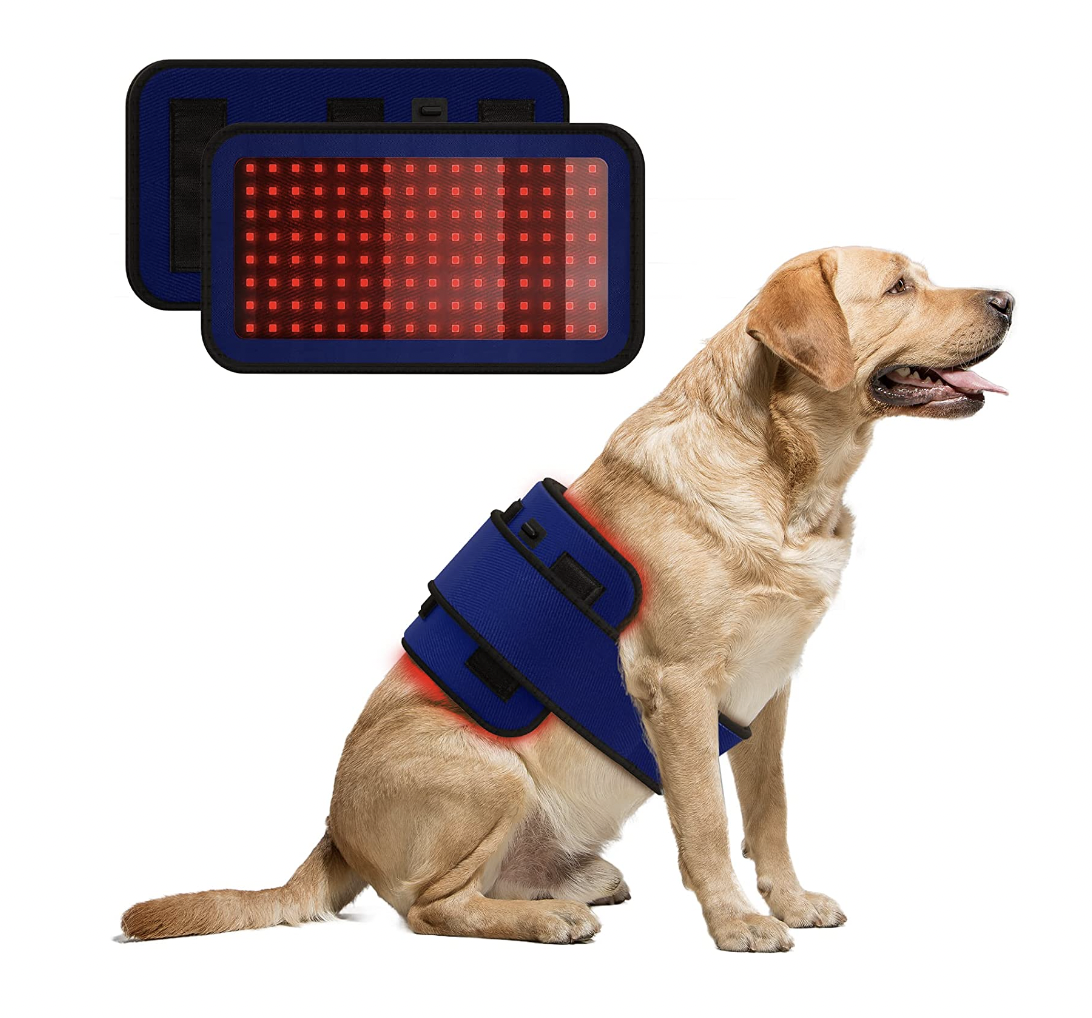
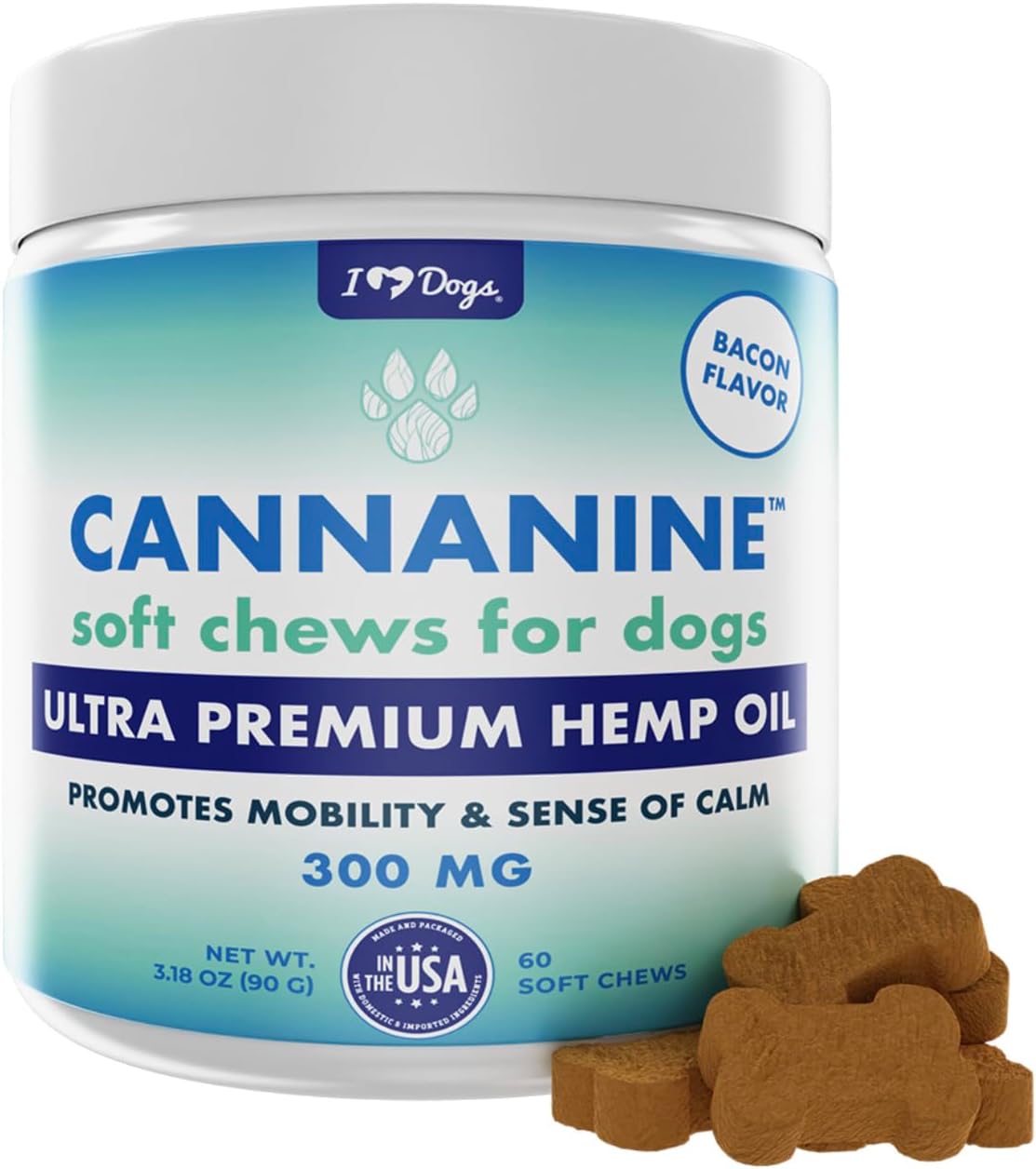
 Toledo, United States.
Toledo, United States.